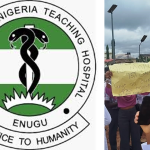
U.S.-Funded PR Network Secretly Targets Nigerian GMO Critics While Enlisting Doctors and Journalists to Shape Public Opinion

In a multi-continent campaign, the U.S. government funded public relations strategies and digital surveillance tools aimed at reshaping Nigerians’ perceptions of genetically modified organisms (GMOs) and pesticides, as well as discrediting critics of industrial agriculture. This is the central finding of a series of investigative reports by Premium Times, Lighthouse Reports, and West Africa Weekly, which expose how foreign influence and private sector interests have permeated Nigerian food policy, public messaging, and even professional medical and media institutions.
Between 2013 and 2019, the United States Agency for International Development (USAID) paid over $400,000 to V-Fluence Interactive, a PR firm founded by Jay Byrne, the former head of communications at agrochemical giant Monsanto. The firm used the money to operate Bonus Eventus, a secretive platform that collected and shared damaging dossiers on over 500 individuals and more than 3,000 organisations, including high-profile Nigerian environmentalists, lawyers, journalists, and politicians who were critical of GMOs and pesticides.
Among those targeted were renowned environmentalist Nnimmo Bassey, head of the Health of Mother Earth Foundation (HOMEF), and Gbadebo Rhodes-Vivour, architect and political leader known for his environmental advocacy. The platform, funded as part of a U.S. global biotechnology support project, accused both men of undermining science and being influenced by ideology, allegations designed to silence dissent and delegitimise local voices opposing industrial biotech expansion in Africa.
Doctors and Journalists Recruited to Sell GMO Message
At the same time, Nigeria’s government was actively promoting pro-GMO messaging. In 2023, the National Biotechnology Development Agency (NABDA) launched a campaign specifically targeting doctors and health professionals, as the frontline of public persuasion. The agency argued that since doctors have daily contact with citizens, they are best placed to “sensitise Nigerians to the safety and benefits of genetically modified crops.”
The strategic position occupied by medical practitioners makes them very important to make Nigerians understand the numerous benefits of GMOs as they have daily contact with the people, hence educating them becomes easy about the safety of it,” said NABDA’s Director-General, Prof. Abdullahi Mustapha, during a national workshop titled “Biotechnology and Biosafety Sensitisation”.
The event was one of several co-organised with groups like the Open Forum on Agricultural Biotechnology (OFAB), a Gates Foundation-linked initiative that promotes GMOs across Africa.
In parallel, journalists were being trained to counter what the agencies called “misinformation” about biotechnology. These training programs encouraged reporters to dismiss environmental concerns as anti-scientific and instead publish content that supports the Nigerian government’s goals for commercialising GMOs.
These efforts amount to state-sponsored marketing for agribusiness, rather than education.
This is propaganda disguised as public health and science reporting. Instead of critically evaluating the health, economic, and ecological risks of GMOs and pesticides, they are asking doctors and journalists to act like brand ambassadors.
It was also found that USAID had funded Nigeria’s biosafety regulator, the National Biosafety Management Agency (NBMA), to the tune of over $200,000, which was used to support “regulatory capacity” and fast-track the approval of GMO crops, including Bt cotton, insect-resistant maize, and genetically modified cowpea. As of 2025, Nigeria has approved over six GMO crops for cultivation and commercial use, more than any other African country.
A parallel investigation by West Africa Weekly has also implicated the Bill and Melinda Gates Foundation in influencing African GMO policy through philanthropy and academic partnerships. The foundation, through funding entities like the AGRA (Alliance for a Green Revolution in Africa), has helped train biosafety regulators, draft biotech-friendly legislation, and embed pro-GMO advisors within ministries across the continent, including Nigeria.
While these efforts are publicly described as support for food security, they are fundamentally about market-making: creating a policy and media environment conducive to the entry of foreign seed and pesticide companies.
They are not giving seeds, they are giving systems. Systems that are patented, dependent on chemicals, and ultimately extractive.
The controversy raises critical questions about the future of food, science, and democracy in Nigeria. At what point does scientific advocacy become manipulation? Can Nigerian institutions remain neutral arbiters when so deeply entangled with foreign funding and influence? And what happens when those raising concerns are quietly smeared in databases shared by robust industry-linked networks?
For many, the revelations confirm longstanding fears that Africa is not just a testing ground for biotech products but also a battleground for narratives, where trust in science and institutions is increasingly mediated by money and strategic messaging.
As Bonus Eventus quietly disappears from the internet and PR firms distance themselves from its content, civil society leaders insist this is just the beginning. Lawsuits are being considered. Legal complaints have been filed. And calls for an independent public inquiry are growing louder.
We must protect the right of Nigerians to speak out, ask questions, and demand transparency, especially when it comes to something as fundamental as food. This isn’t about opposing science. It’s about defending sovereignty.
Read More:
- Ghana Immigration Nabs 50 Nigerians for Cybercrime and Human Trafficking at McCarthy Hills
- Burkina Faso Hosts Egypt’s Foreign Minister to Strengthen Fight Against Terrorism with CSS Alliance
About The Author
Related Articles
AES Condemns Niamey Airport Attack, Warns of Coordinated Destabilisation
The Alliance of Sahel States has strongly condemned the armed attack on...
ByWest Africa WeeklyFebruary 2, 2026Mali Cedes Strategic Land to Guinea to Deepen Trade Cooperation
Mali has approved the transfer of a strategic parcel of land to...
ByWest Africa WeeklyFebruary 2, 2026Senegal to Appeal CAF Sanctions After AFCON Final Controversy
Senegal has announced plans to formally appeal the sanctions imposed by the...
ByWest Africa WeeklyFebruary 2, 2026Burkina Faso Takes Legal Step Toward Nuclear Energy Development
Burkina Faso has voted to join the Vienna Convention on Civil Liability...
ByWest Africa WeeklyFebruary 2, 2026












Leave a comment